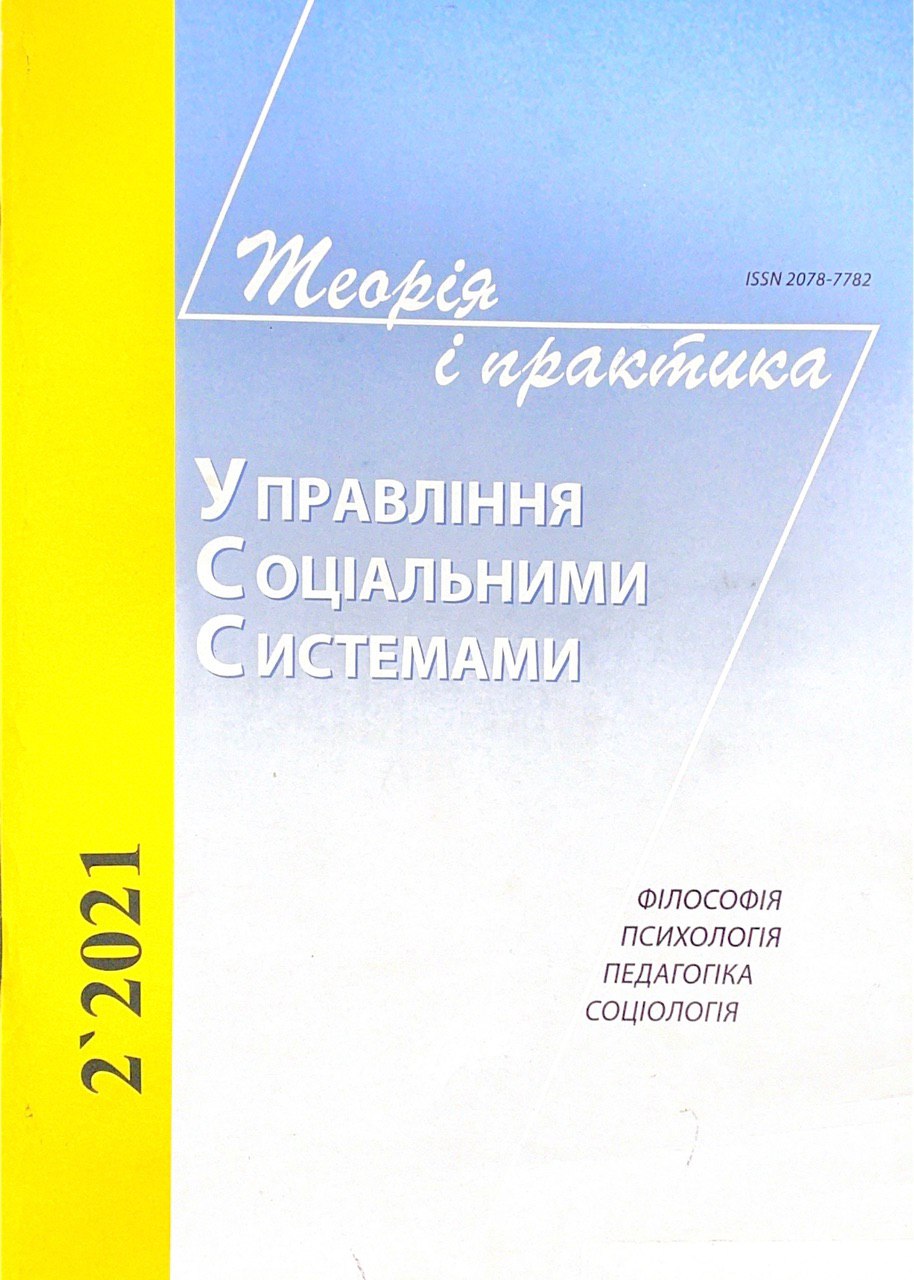ТЕХНОЛОГІЯ СТВОРЕННЯ ТА ПРОВЕДЕННЯ РОЛЬОВОЇ ГРИ В ПЕДАГОГІЧНОМУ ПРОЦЕСІ
DOI:
https://doi.org/10.20998/2078-7782.2021.2.04Ключові слова:
сучасні інтерактивні методи навчання, рольова гра, ефект лабілізації у процесу навчання майбутніх фахівців, ефект закріплення навчального матеріалу та відпрацювання практичних навичок у процесу навчання майбутніх фахівців, підвищення зацікавленості студентів навчальним матеріалом, взаємодія викладачів та студентів.Анотація
В публікації обґрунтовано доцільність використання рольової гри у навчальному процесі у закладі вищої освіти. Проведено аналіз сучасних інтерактивних методів навчання, які застосовуються викладачами різних країн світу. Розглянуто сучасний стан впровадження моделюючої рольової гри в українських закладах вищої освіти. Висвітлено технологію створення та проведення рольової гри в педагогічному процесі. Проаналізовано доцільність та ефективність використання методу гри в умовах пандемії 2020‒2021 років із метою підвищення ефективності дистанційної форми навчання. Сформовано висновки щодо доцільності використання рольової гри в умовах дистанційної форми педагогічного процесу.
Посилання
1. Pidbutska, N. (2017), “Future Engineers’ Psychological Readiness for Common Competencies Development in the Process of Studying “Professional Psychology””, Science and Education, iss. 11, pp. 133–138
2. “William Hawkes-Robinson. Roleplaying Games Used as Educational and Therapeutic Tools for Youth and Adults”,available at: https://www.researchgate.net/publication/237074784_Roleplaying_Games_Used_as_Educational_and_Therapeutic_Tools_for_Youth_and_Adults
3. Marco Antonio Ferreira RandiI, Hernandes Faustino de Carvalho “Learning through role-playing games”, an approach for active learning and teaching, issn 0100-5502 available at: http://www.scielo.br/scielo.php?script=sci_arttext&pid=S010055022013000100012
4. Kilgour, P., Reynaud, D., Northcote, M. T., & Shields, M. (2015), “Roleplaying as a tool to facilitate learning, selfreflection and social awareness in teacher education”, International Journal of Innovative Interdiscip-linary Research, no. 2(4), no/ 8–20, available at: https://research.avondale.edu.au/cgi/viewcontent.cgi?article=1075&context=edu_papers
5. Baciu Ana Cristina, “From Role Play to Gamification as Educational Methods”, available at: https://www.europeanproceedingscom/files/data/article/49/1434/article_49_1434_pdf_100.pdf
6. Claus Nygaard, Nigel Courtney, Elyssebeth Leigh, Jac Geurts, Richard D. Duke (2013), “Simulations, Games and Role Play in University Education (Learning in Higher Education series)”, Libri Publishing June 1, 2013 р. 344
7. Dimitrios Vlachopoulos, Agoritsa Makri (2017), “The effect of games and simulations on higher education: a systematic literature review”, International Journal of Educational Technology in Higher Education,no. 14(22), available at: https://d-nb.info/1141475928/34
8. Dukhnevich V. M. (2014), “Applied questions of technology of preparation and carrying out of cognitively oriented trainings of communication: methodical recommendations”, nat. acad. ped. sciences of Ukraine, inst. of soc. and flight. Psychology, K .: Millennium, p.84 available at: https://core.ac.uk/download/pdf/32309469.pdf
9. Alizarchik, L. L., Golyas. V. O. (2016), “Application of Internet technologies in the study of mathematical disciplines”, VSU Bulletin, no.3 (92). pp. 74–82
10. Kvasnik, O. V., Shapolova , V. V. “Experience of attracting interactive methods ofinteraction with students in modern conditions of distance learning”, Collection of scientific works ΛΌГΣ, available at: https://doi.org/10.36074/logos05.02.2021.v5.12, pp. 38–41
11. Shatz, Itamar (2015), “Using Gamification and Gaming in Order to Promote Risk Taking in the Language Learning Process”, Proceedings of the 13th Annual MEITAL National Conference, Haifa, Israel:Technion, pp. 227–232
12. Shapolova, V. V. (2020), “The effectiveness of the method of graphic facilitation during the improvement of communicative skills of future managers”, Theory and practice of social systems management: philosophy, psychology, pedagogy, sociology: a quarterly scientificpractical journal, H.: NTU “KhPI”, no. 2, pp. 54–64
13. Ricardo Batista, Carlos Vaz de Carvalho (2008), “Work in Progress – Learning Through Role Play Games”,October22–25, Saratoga Springs, NY, 38th, asee/ieee Frontiers in Education Conferenceр, available at: file:///C:/Users/HP/Downloads/1685.pdf
14. Amanda Nathale Soares, Maria Flávia Gazzinelli, Vânia de Souza, Lucas Henrique Lobato Araújo (2015), “The role playing game (rpg) as a pedagogical strategy in the training of the nurse: an experience report on the creation of a game text context nursing”, Florianópolis, no. 24(2), no. 600–8, available at: http://www.indexf.com/textocontexto/2015pdf/24600e.pdf
15. Richard Heinz Patrick Prager (2019),“Exploring the Use of Role-playing Games in Education”, Master of Teaching Research Journal, issue 2, available at:file:///C:/Users/HP/Downloads/29606-Article%20Text-81500-2-10-20191231.pdf
16. Rudestam, K. (2006), “Group psychotherapy. Psychocorrection groups”,Theoryand practice, per. with english, 2nd ed.M.: Progress
17. Azarnova A. (2011), “The method of roleplaying in training”, St. Petersburg: Speech, p.347, isbn 978-5-9268-1064-3
18. Vachkov, I . V. (1999), “Fundamentals of group training technology”, Textbook allowance, M: Publishing House “Axis-89”, p. 176, available at: http://psylib.org.ua/books/vachk01/index.htm
19. Sidorenko, E. (2007),“Technologies for creating training”, From design to result, st. Petersburg, pp. 336
20. Fopel, K. (2013), “Technology of training, M .: Genesis, pp. 272
21. Bonwell, C. C., & Eison, J. A. (1991), “Active learning: Creating excitement in the classroom”, Washington, DC: The George Washington University
22. Harbour, E., & Connick, J. (2005), “Role playing games and activities rules and tips”, available at: https://www.businessballs. com/roleplayinggames.htm
23. Lebaron, J., & Miller, D. (2005), “Thepotential of jigsaw role playing to promote the social construction of knowledge in an online graduate education course”, available at: http://paws.wcu.edu/jlebaron/Jigsaw-FnlTCRpdf_050812.pdf
24 “Role Playing”, Center for Innovative Teaching and Learning at Northern Illinois University available at: https://www.niu.edu/citl/resources/guides/instructionalguide/roleplaying.shtml
25. Law of Ukraine “On Higher Education” of 01.07.2014 no. 1556–VII
26. Strategies for the development of higher education in Ukraine for 2021–2031 available at: https://mon.gov.ua/storage/app/media/rizne/2020/09/25/rozvitkuvishchoi-osviti-v-ukraini-02-10-2020.pdf
27. Zh. Bohdan, N. Sereda, T. Solodovnyk (2020), “Formuvannia komunikativnoi kompe-tentnosti studentiv zakladiv vyschoi osviti: monografiia”, Kharkiv: Drukarnia Madrid, p. 26

##submission.downloads##
Опубліковано
Номер
Розділ
Ліцензія
Авторське право (c) 2021 Галина Попова, Вікторія Шаполова

Ця робота ліцензується відповідно до Creative Commons Attribution-NonCommercial-NoDerivatives 4.0 International License.
Автори, які публікуються у цьому журналі, погоджуються з наступними умовами:- Автори залишають за собою право на авторство своєї роботи та передають журналу право першої публікації цієї роботи на умовах ліцензії Creative Commons Attribution License, котра дозволяє іншим особам вільно розповсюджувати опубліковану роботу з обов'язковим посиланням на авторів оригінальної роботи та першу публікацію роботи у цьому журналі.Автори, які публікуються у цьому журналі, погоджуються з наступними умовами:
